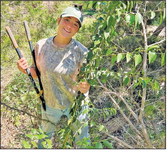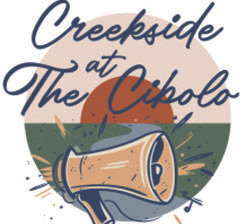Hi, my name is Harlo Longhurst, and I’m a junior at Texas Tech University studying natural resource management.
This summer, I had the incredible opportunity to intern at the Cibolo Center for Conservation, where I split my time between working with the land manager and the research scientist.
I grew up in Boerne and have been connected to the nature center for as long as I can remember. It’s a place that feels like home and holds a special place in my heart.
Interning here wasn’t just about building my resume — it was a chance to dive deep into the heart of environmental conservation and get my hands dirty making a real impact.
Contributing to the beauty and health of the center was, without a doubt, the highlight of my summer.
This internship has been a wild and rewarding ride. I’ve done just about everything under the sun — some days involved sledgehammers, chainsaws, and wire cutters; others had me working with microscopes, petri dishes and clipboards. What I loved most was the balance between fieldwork and research. Being involved in both sides of the work gave me a well-rounded, hands-on experience that deepened my passion for conservation.
Throughout the summer, I had the chance to contribute to several projects around the center. One major effort I assisted with was erosion control near Cibolo Creek. This involved installing water bars, large wooden logs staked into the ground, to prevent downslope erosion and protect fragile vegetation in the area.
Another significant project focused on removing invasive plant species, primarily China tallow. We surveyed the property on foot, cutting down any China tallow trees we encountered and applying herbicide to the stumps to prevent regrowth. This effort aimed to stop the spread of the invasive species and give native plants a better chance to thrive.
I also contributed to a series of ecological surveys designed to assess the health of the environment and its inhabitants. These surveys targeted birds, fish, ants, macroinvertebrates and prairie vegetation. For the macroinvertebrate survey in particular, we collected debris samples from the creek and examined them under a microscope to sort and identify various organisms.
By classifying each specimen, we were able to help analyze the diversity and overall quality of the aquatic ecosystem.
One of my biggest challenges during this internship was getting comfortable with jumping into unfamiliar experiences. Though I enjoy challenges, I tend to avoid situations that feel out of my depth with either skill or knowledge. This internship pushed me to trust myself and take initiative, even when unprepared. Embracing these moments helped me develop new skills, build confidence and grow personally and professionally by seeing discomfort as a chance to grow.
Through this internship, I experienced many different aspects of conservation and saw firsthand how various tasks contribute to lasting environmental impacts. I now have a clearer understanding of what it takes to work in conservation and thrive in the field of natural resource management.
My time at the center has been truly transformative. This internship not only reaffirmed my commitment to a career in conservation but also deepened my understanding of the field. Through hands-on work, collaborative projects, and mentorship from dedicated professionals, I gained insights far beyond what I could have learned in the classroom. Each day brought new opportunities to grow and contribute meaningfully.
I’m deeply grateful for the experience and leave with a stronger sense of purpose and a renewed passion for conservation.
Interested in becoming an intern at The Cibolo? Email [email protected].










Comment
Comments